Libertarian Social Democracy & National Defense
.png)
I wanted to re-visit an idea that I proposed in Libertarian Social Democracy: The Structure of a Free Society. In that essay, I floated the idea of an autonomous democratic national guard confederation. I suggested that career politicians should be eliminated by choosing political candidates via sortition or lottery, and I asserted that politicians ought not to be in control of the military. The military, I suggested, ought to have some degree of autonomy and independence from the State.
I received some critical feedback from personz. He responded to my post with the following observation/objection:
"I would also like to see your anti-career politician features extended to the military. It seems to be extended to the police ("Law-enforcement could be done through communal police, chosen by lottery or sortition and on a rotational basis.") but is just as important for military. But how to do this? Compulsory military service is popular (see Switzerland and Israel), and this would be in line with your limits to the voluntary philosophy in the proposal. But there might be a better (or supplementary?) way involving choice but with rules of service, perhaps limiting the number of years one can be in the military.
"Practically, many of those who have trained in the army and left use the skills they learned there as civilians. This does not always just mean those aspects traditionally associated with military (i.e. security) but also engineering, computing, etc. So you should bake in measures to deal with the problem of militias, paramilitaries, dodgy security companies and private investigators forming. This happens all the time today and I see no reason why it wouldn't continue.'The military would not be under the control of the State, but rather under the control of the soldiers themselves, but it would be accountable to the regional, provincial, or state level government.'
and
'Politicians should not be allowed to send troops to invade another country. Instead, the national guard should be accountable to the regional government at the state/province level. Moreover, the military should have some degree of autonomy.'
"That personally sends a kind of terror into me. I know and have known many soldiers and to put it very mildly, our goals, ethical and moral philosophy, and most importantly views on the deployment of violence are at odds. I'd like to think we would get responsible leadership but I would want details on how exactly they would be accountable to the various levels of government.
"A strong and independent military also sounds like a recipe for a coup. Just look at Thailand. At the first bump in the road made by the government, something of the 'hard fork' variety, it would be the perfect situation for the military to come in and 'restore order' and hey presto, fascist martial law is imposed. I'd be particularly interested on your thoughts on this point."
As with all things, there is a dialectic at play here. There is an antagonism between positive and negative consequences. Having a military that is somewhat independent of the State has both positive and negative results. For instance, the ability to easily form a military coup is what allowed Turkey to be a modern secular society for so long. Regrettably, the last coup attempt failed and Erdoğan has achieved a dictatorial status and is transforming Turkey into a religious despotism. The relative autonomy of the military and the possibility of the military coup is what allowed liberal democracy and democratic values to prevail in Turkey for decades.
At the same time, the constant possibility of a military coup has negative effects. This can lead to instability and encourage people to back "strong man" politicians. The most recent coup attempt failed because Erdoğan is a popular fascist. The people of Turkey favor a stable fascist regime and the protections that it secures for them over the instability that would result from a toppled regime.
I am well aware of the debate surrounding national defense. Should we have a standing army? a well-regulated militia? a somewhat autonomous army? My position in my former post was vague and somewhat ambiguous. I did say, more or less, that I do not what a military that is entirely independent of the government.
"The military should be independent of the State and it should be run on a democratic basis. Soldiers should elect their own superiors. High ranking leaders within the military should have to be democratically confirmed/approved by a communal council of delegates. The military would not be under the control of the State, but rather under the control of the soldiers themselves, but it would be accountable to the regional, provincial, or state level government."(Libertarian Social Democracy: The Structure of a Free Society)
This is, of course, a vague and underdeveloped theory. One may well ask, "What would such accountability entail?" I would like to move forward a little with developing upon this aspect of my theory of libertarian social democracy.
To get a better understanding of the problems here, it would be good to look back at the debates that took place during the American Revolution. I have in mind the federalist-antifederalist debate and the ideas of various founding fathers on issues of national defense.
On the one hand, antifederalists warned of the dangers of a standing army.
"A standing army in the hands of a government placed so independent of the people, may be made a fatal instrument to overturn the public liberties; it may be employed to enforce the collection of the most oppressive taxes; and to carry into execution the most arbitrary measures. An ambitious man who may have the army at his devotion, may step up into the throne, and seize upon absolute power.
"The absolute unqualified command that Congress have over the militia may be made instrumental to the destruction of all liberty both public and private; whether of a personal, civil or religious nature....
"Secondly, the rights of conscience may be violated, as there is no exemption of those persons who are conscientiously scrupulous of bearing arms. These compose a respectable proportion of the community in the State [Pennsylvania]. This is the more remarkable, because even when the distresses of the late war and the evident disaffection of many citizens of that description inflamed our passions, and when every person who was obliged to risk his own life must have been exasperated against such as on any account kept back from the common danger, yet even then, when outrage and violence might have been expected, the rights of conscience were held sacred....
"Thirdly, the absolute command of Congress over the militia may be destructive of public liberty; for under the guidance of an arbitrary government, they may be made the unwilling instruments of tyranny."(Antifederalist Paper 29)
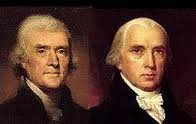
Thomas Jefferson was actually in agreement with the antifederalists on this issue. For Jefferson, the right to bear arms was linked to the issue of national defense. James Madison agreed in linking these two issues. The 2nd Amendment to the Constitution reads:
"A well regulated Militia, being necessary to the security of a free State, the right of the people to keep and bear Arms, shall not be infringed."(The Constitution of United States of America, 2nd Amendment)
First off, we are given the justification for the right to bear arms: because a well-regulated militia is necessary for the security of a free state. When Madison drafted the Bill of Rights, he was echoing Jefferson's own draft of Virginia's Constitution.
"No freeman shall be debarred the use of arms [within his own lands].
"There shall be no standing army but in time of actual war."―Thomas Jefferson (Draft Constitution for Virginia [June 1776])
The reason that the people needed to bear arms was so that they could form a well-regulated militia. Jefferson's rationale for this was rooted in his desire to ensure that no standing army would be maintained by the centralized State.
"For defense against invasion, their number is as nothing; nor is it conceived needful or safe that a standing army should be kept up in time of peace for that purpose. Uncertain as we must ever be of the particular point in our circumference where an enemy may choose to invade us, the only force which can be ready at every point and competent to oppose them, is the body of neighboring citizens as formed into a militia. On these, collected from the parts most convenient, in numbers proportioned to the invading foe, it is best to rely, not only to meet the first attack, but if it threatens to be permanent, to maintain the defense until regulars may be engaged to relieve them. These considerations render it important that we should at every session continue to amend the defects which from time to time show themselves in the laws for regulating the militia, until they are sufficiently perfect."―Thomas Jefferson (First Annual Message [December 8, 1801])
In his letter To General Thaddeus Kosciusko [April 2, 1802], Jefferson spoke favorably about the first Congress because of the fact that they "reduced the army and navy to what is barely necessary."
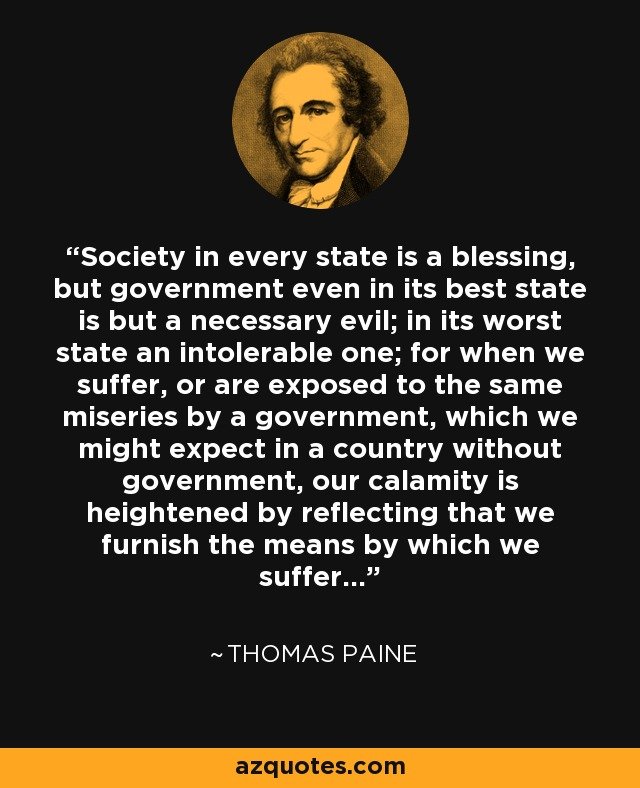
On the other hand, standing armies have their benefits in spite of their dangers. While a well-regulated militia is a good defense against an invasion, a militia isn't necessarily good at dealing with long-term conflicts. If there is a sustained assault that amounts to a state of war rather than a short-term series of battles to prevent an invasion, then a standing army may be necessary. Thomas Paine, reflecting on events during the Revolutionary War, gave this counterpoint to Jefferson and the antifederalists.
"From an excess of tenderness, we were unwilling to raise an army, and trusted our cause to the temporary defense of a well meaning militia. A summer's experience has now taught us better; yet with those troops, while they were collected, we were able to set bounds to the progress of the enemy, and, thank God! they are again assembling. I always considered a militia as the best troops in the world for a sudden exertion, but they will not do for a long campaign."―Thomas Paine (The American Crisis I [December 19, 1776])
In addition to being better trained and equipped for prolonged conflicts, standing armies also serve as a deterrence against invasion. An invading army may feel that they are better trained than a loose militia defending a specific territory, but they may have less confidence in their ability to take over a territory if the land they are invading also has a strong standing army. The existence of a standing army may help to avoid armed conflict by deterring would-be aggressors.
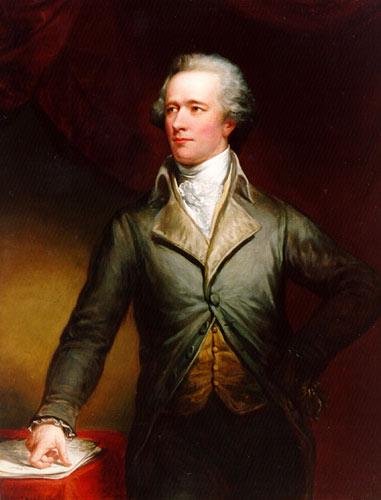
Alexander Hamilton made the case that the militias ought to be made subject to the control of the centralized State when they are "called into the actual service of the United States" for purposes of national defense. Hamilton did not think that there was much to fear in a standing army, but he thought that the antifederalists were actually working against themselves when it came to the militias. If the militias could be placed under the control of the centralized State when called upon, then there would be no need for a standing army.
"If standing armies are dangerous to liberty, an efficacious power over the militia, in the body to whose care the protection of the State is committed, ought, as far as possible, to take away the inducement and the pretext to such unfriendly institutions. If the federal government can command the aid of the militia in those emergencies which call for the military arm in support of the civil magistrate, it can the better dispense with the employment of a different kind of force. If it cannot avail itself of the former, it will be obliged to recur to the latter. To render an army unnecessary, will be a more certain method of preventing its existence than a thousand prohibitions upon paper....
"By a curious refinement upon the spirit of republican jealousy, we are even taught to apprehend danger from the militia itself, in the hands of the federal government."―Alexander Hamilton (Federalist Paper 29)
Hamilton's approach gives us a militia that is much closer to a standing army. The downside to this is that we end up with what we currently have. We now have national guards under the control of the centralized State which are used for aggression and economic imperialism rather than national defense.
The fact that the right to bear arms was related to the idea of maintaining a well-regulated militia does not negate the fact that it was associated with the idea of empowering the people to overthrow the government if it became despotic. The militia was to include all able-bodied men. Consequently, everyone had to have a right to bear arms. At the same times, this militia, which was coterminous with the people as a whole insofar as all the people were in it, would have the power to resist domestic tyranny if necessary.
"Besides the advantage of being armed, which the Americans possess over the people of almost every other nation, the existence of subordinate governments, to which the people are attached, and by which the militia officers are appointed, forms a barrier against the enterprises of ambition, more insurmountable than any which a simple government of any form can admit of. Notwithstanding the military establishments in the several kingdoms of Europe, which are carried as far as the public resources will bear, the governments are afraid to trust the people with arms. And it is not certain, that with this aid alone they would not be able to shake off their yokes. But were the people to possess the additional advantages of local governments chosen by themselves, who could collect the national will and direct the national force, and of officers appointed out of the militia, by these governments, and attached both to them and to the militia, it may be affirmed with the greatest assurance, that the throne of every tyranny in Europe would be speedily overturned in spite of the legions which surround it."―James Madison (The Federalist No. 46 [January 29, 1788])
The militia and the right to bear arms was an institution with two purposes. Its primary purpose was to serve as a defense against invasion. Its secondary purpose was to protect the people from domestic tyranny on the part of their own government.
This leaves one last text from the federalist-antifederalist debates that I would like to reflect on.
"The military forces of a free country may be considered under three general descriptions — 1. The militia. 2. the navy — and 3. the regular troops — and the whole ought ever to be, and understood to be, in strict subordination to the civil authority; and that regular troops, and select corps, ought not to be kept up without evident necessity. Stipulations in the constitution to this effect, are perhaps, too general to be of much service, except merely to impress on the minds of the people and soldiery, that the military ought ever to be subject to the civil authority, &c. But particular attention, and many more definite stipulations, are highly necessary to render the military safe, and yet useful in a free government; and in a federal republic, where the people meet in distinct assemblies, many stipulations are necessary to keep a part from transgressing, which would be unnecessary checks against the whole met in one legislature, in one entire government. — A militia, when properly formed, are in fact the people themselves, and render regular troops in a great measure unnecessary. The powers to form and arm the militia, to appoint their officers, and to command their services, are very important; nor ought they in a confederated republic to be lodged, solely, in any one member of the government. First, the constitution ought to secure a genuine and guard against a select militia, by providing that the militia shall always be kept well organized, armed, and disciplined, and include, according to the past and general usuage of the states, all men capable of bearing arms; and that all regulations tending to render this general militia useless and defenceless, by establishing select corps of militia, or distinct bodies of military men, not having permanent interests and attachments in the community to be avoided. I am persuaded, I need not multiply words to convince you of the value and solidity of this principle, as it respects general liberty, and the duration of a free and mild government: having this principle well fixed by the constitution, then the federal head may prescribe a general uniform plan, on which the respective states shall form and train the militia, appoint their officers and solely manage them, except when called into the service of the union, and when called into that service, they may be commanded and governed by the union. This arrangement combines energy and safety in it; it places the sword in the hands of the solid interest of the community, and not in the hands of men destitute of property, of principle, or of attachment to the society and government, who often form the select corps of peace or ordinary establishments: by it, the militia are the people, immediately under the management of the state governments, but on a uniform federal plan, and called into the service, command, and government of the union, when necessary for the common defence and general tranquility."―Richard Henry Lee (The Federal Farmer XVIII [January 25, 1788])
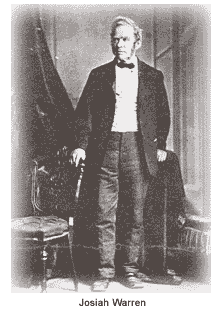
From here we may fast forward to Josiah Warren, that "unterrified Jeffersonian Democrat" who was the first American anarchist. Warren was an advocate of freedom of conscience. In order to check the power of the military, he recommended allowing a sort of conscientious objection. He did not think just that those opposed to war should be able to opt out of military service, but that every soldier should be able to disobey unjust orders.
“Another illustration is seen in an army. The commander-in-chief is the Individual leader of the whole. Other officers under him, each have the lead of a particular individualized portion of the body. Each of these portions is again divided, and an individual has the particular lead of each of these most minute subdivisions. All these different leads coincide with each other. All this is a beautiful development of order, without which nothing could be accomplished! Only one more step is in the same direction wanting! And this is, that the lead (i.e. the conscience) which each individual subordinate or soldier has by nature within him, should COINCIDE or harmonize with all the other leads, as in the post-office, or else, that he should not be required to act! If this would present a check to action, it would check only vicious action, and furnish the only corrective for that vulgar and criminal ambition that has so uniformly desolated and cursed the world. The word ‘commander’ would then be changed into the word leader.”—Josiah Warren (True Civilization, parentheses added)
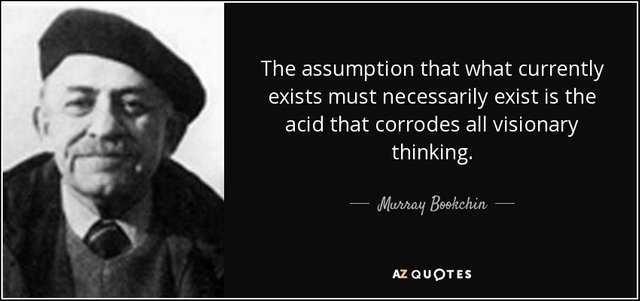
The insights of anarchists in general and Murray Bookchin in particular are also worth noting. The anarchist tradition in general can be seen as a development within the republican and federalist tradition. Anarchists and democratic confederalists just tend to more consistently hold to the principles of federalism, liberalism, and democracy.
"As more and more municipalities democratized themselves and formed confederations, Bookchin observed, their shared power would constitute a threat to the state and to the capitalist system. Resolving this unstable situation could well involve a confrontation, as the existing power structure would almost certainly move against the self-governing polity. The assemblies, he believed, would have to create an armed guard or citizens’ militia to protect their newfound freedoms.
"In this respect, he followed the longstanding recognition by the international socialist movement that the armed people, citizens’ militias as an alternative to standing armies, was a sine qua non for a free society. Bakunin, for one, wrote in the 1860s: 'All able-bodied citizens should, if necessary, take up arms to defend their homes and their freedom. Each country’s military defense and equipment should be organized locally by the commune, or provincially, somewhat like the militias in Switzerland or the United States.'
"A citizens’ militia is not merely a military force but also manifests the power of a free citizenry, reflecting their resolve to assert their rights and their commitment to their new political dispensation. The civic militia or guard would be democratically organized, with officers elected both by the militia and by the citizens’ assembly, and it would exist under the close supervision of the citizens’ assemblies."—Janet Biehl (Bookchin’s Revolutionary Program)
Thus far, I have only given you a bunch of things to think about. I have not actually stated my own opinions or indicated what solution I would personally recommend to the problems inherent in national defense. From here on out, I will offer some constructive thoughts.
As personz pointed out, an independent military can leave open the possibility of a military coup. One possible solution to this problem is to democratize the military and require "military service by all citizens." This was suggested by Proudhon in Programme révolutionnaire, although he suggested it as a way of avoiding the injustice of conscription via a draft. Mikhail Bakunin and Murray Bookchin had similar approaches. Jefferson too held that all able-bodied citizens ought to serve in the militia. If we were to have an independent military, consisting of federated militias or national guards, and this military were run on a democratic basis, we would not need to fear a military coup overthrowing a democratic government. The people that elect the government would be the same people that constitute the membership of the military. However, if the government ever became undemocratic, a military coup would then be a realistic route to restore democracy.
Although mandatory military service is somewhat formally un-libertarian, the end result would be more libertarian than what would follow from any conceivable alternative. Thus, such a solution would be consistent with my overall dialectical libertarian approach. However, I believe it would be desirable to allow for exceptions on the grounds of conscientious objection, provided that the objector can reasonably demonstrate their conflict of conscience. And this conscientious objection should not be limited only to those who have a religious objection to military service, as if only religious individuals are entitled to have a conscience.
I must stress here that I am not in favor of mandatory military service. I am in favor of mandatory military service on the condition that the military be democratically controlled by the soldiers themselves. If service is mandatory and decisions are made primarily by people other than the soldiers (e.g. politicians or officers appointed by politicians), then military service would be indistinguishable from slavery.
The militias should not be loose grassroots initiatives but established and well-regulated institutions that are democratically controlled. There would not be multiple militias in the same territory. Forming private militias, private police forces, and other paramilitary organizations would need to be banned by the Constitution of this libertarian social democratic society. All able-bodied citizens would serve in the formal militia. Candidates for leadership positions would be chosen randomly by sortition or lottery. The soldiers would then elect their own leadership from the randomly-selected candidates. High leadership positions would have to be confirmed or affirmed by a correspondingly ranking body in the government. The highest ranking individual in the militia at the municipal level would be elected by the soldiers subordinate to them and would be confirmed by the municipal council. The highest ranking soldier at the state or provincial level would be confirmed by the provincial council, and so on. If the leadership of the military started to behave in erratic or unethical ways, the soldiers could recall people in leadership positions and replace them. At the same time, the ordinary democratic government should also have the right to depose military leaders for any reason whatsoever.
The militias should be federated in such a way that they can function as a centralized military when necessary. There should be a democratically-elected leadership at the national level. And there should be certain regulations and standards established for the militia at the national level. The State should guarantee that all the militias have similar standards when it comes to training. The State should also ensure that they also all have access to similar equipment and weaponry. At all times, 10% of the soldiers in the militia should be activated as regulars. These regular soldiers should be randomly selected via sortition/lottery. They should serve for a term of four to six years and then be replaced by other soldiers chosen by sortition. These regulars should maintain a navy and air force for national defense purposes. The air force and navy should be under the control of the national level leadership of the militia confederation. Any decision to go to war should have to be made with full agreement between the national leadership of the military and the democratic congress at the national level.
Additionally, the ideal of freedom of conscience and conscientious objection put forth by Josiah Warren should be implemented to whatever extent proves to be possible and realistic. If the military is being mobilized for some action, soldiers ought to be able to refuse to participate on the grounds that the action is unethical. This will not cripple the defense function of the military. Soldiers will willingly fight whenever they believe they are fighting for a just cause, like defending their friends and families from foreign or domestic threats. However, soldiers will not willingly volunteer to go to war in order to take oil from foreign nations. No sane individual will put himself in harms way for such a cause. This right of conscientious objection, extended to every soldiers, would allow soldiers to conscientiously object to any particular military action, thereby serving as a check on the power of politicians and military leaders. While the ordinary soldier will put himself in harms way to defend his nation, he will not put himself in harms way in order to do the bidding of corporations.